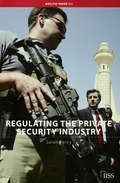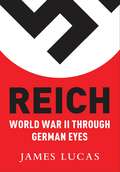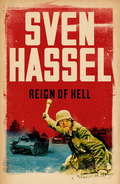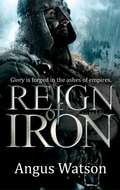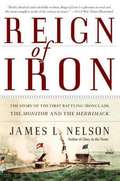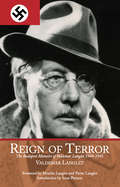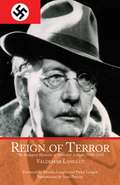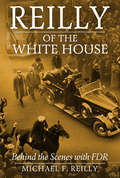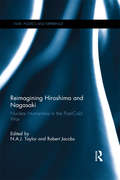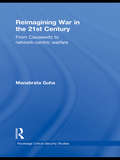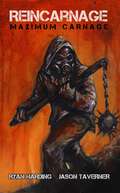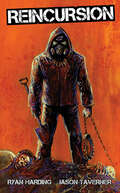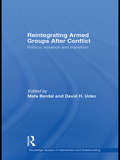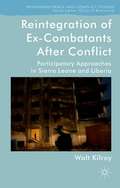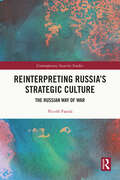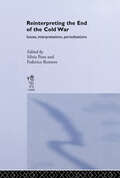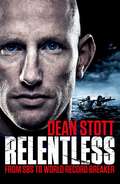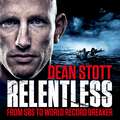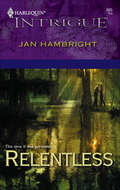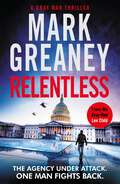- Table View
- List View
Regulating Business for Peace
by Jolyon FordThis book addresses gaps in thinking and practice on how the private sector can both help and hinder the process of building peace after armed conflict. It argues that weak governance in fragile and conflict-affected societies creates a need for international authorities to regulate the social impact of business activity in these places as a special interim duty. Policymaking should seek appropriate opportunities to engage with business while harnessing its positive contributions to sustainable peace. However, scholars have not offered frameworks for what is considered 'appropriate' engagement or properly theorised techniques for how best to influence responsible business conduct. United Nations peace operations are peak symbols of international regulatory responsibilities in conflict settings, and debate continues to grow around the private sector's role in development generally. This book is the first to study how peace operations have engaged with business to influence its peace-building impact.
Regulating the Private Security Industry: Regulating The Private Security Industry (Adelphi series)
by Sarah PercyThe under-regulation of the private security industry has increasingly become a topic of media and academic interest. This Adelphi Paper enters the debate by explaining why the industry requires further regulation, and what is wrong with the current system. It begins by briefly defining the industry and explaining the need for more effective regulation, before analysing three types of regulation: domestic, international and informal (including self-regulation).
Reich: World War II Through German Eyes
by James LucasWhile Allied propaganda would have us believe that during the Second World War the German population were downtrodden workers, with no rights and totally under the power and influence of the all-controlling Gestapo, the truth is somewhat different. While the Allies saw Hitler as an evil to be removed from power, in 1933 the German people saw him as a savior, able to rescue them from the humiliation of Versailles and provide a strong leader. The German people themselves felt that they had social benefits unmatched by their neighboring states, and that its poverty had been eliminated while their economy had been stabilized. James Lucas presents fascinating insight into the real Reich, a glimpse into the life on the German home front. After many years' research and interviews with civilians and German soldiers, Lucas offers a study of the social, economic and military phenomena of the Nazi regime.
Reign of Hell
by Sven HasselA sudden curtain of silence fell over the burning city. All that could be heard was the steady crackling of flames...Hitler's penal regiments advance on Poland. Himmler has given the order: Warsaw must be razed to the ground. But the Polish Home Army are not willing to give in to the German troops so easily. As the city erupts into an inferno of flames and gunfire, Sven and his comrades find themselves caught between the sadism of the SS and the guerrilla warfare of the Polish Resistance...REIGN OF HELL is a gripping insight into the Warsaw Uprising of 1944, and the bloodshed that ensued as the Polish tried desperately to liberate themselves from the German occupation.
Reign of Hell (Sven Hassel War Classics)
by Sven HasselA sudden curtain of silence fell over the burning city. All that could be heard was the steady crackling of flames...Hitler's penal regiments advance on Poland. Himmler has given the order: Warsaw must be razed to the ground. But the Polish Home Army are not willing to give in to the German troops so easily. As the city erupts into an inferno of flames and gunfire, Sven and his comrades find themselves caught between the sadism of the SS and the guerrilla warfare of the Polish Resistance...REIGN OF HELL is a gripping insight into the Warsaw Uprising of 1944, and the bloodshed that ensued as the Polish tried desperately to liberate themselves from the German occupation.
Reign of Iron (Iron Age #3)
by Angus WatsonWARRIOR QUEENS AND ROMAN INVADERS DO BATTLE IN THE FINAL VOLUME OF THIS THRILLING EPIC FANTASY TRILOGY.Caesar's soldiers have murdered, massacred and pillaged their way through Gaul and loom on the far side of the sea, ready to descend upon Britain - with them are an unstoppable legion of men twisted by dark magic. Somehow Queen Lowa must repel the invasion, although her best general is dead and her young druid powerless. She faces impossible odds, but when the alternative is death or slavery, a warrior queen will do whatever it takes to save her people. EVERY EMPIRE HAS ITS DOWNFALL.
Reign of Iron: The Story of the First Battling Ironclads, the Monitor and the Merrimack
by James L. NelsonAt the outbreak of the Civil War, North and South quickly saw the need to develop the latest technology in naval warfare, the ironclad ship. After a year-long scramble to finish first, in a race filled with intrigue and second guessing, blundering and genius, the two ships -- the Monitor and the Merrimack -- after a four-hour battle, ended the three-thousand-year tradition of wooden men-of-war and ushered in "the reign of iron." In the first major work on the subject in thirty-five years, novelist, historian, and tall-ship sailor James L. Nelson, acclaimed author of the Brethren of the Coast trilogy, brilliantly recounts the story of these magnificent ships, the men who built and fought them, and the extraordinary battle that made them legend.
Reign of Terror: The Budapest Memoir of Valdemar Langlet
by Valdemar LangletAlthough not as well known as Raoul Wallenberg, Valdemar Langlet was the saviour of thousands of Jews in Budapest in the last two years of the Second World War.Entirely without the permission or the financial support of the Swedish Red Cross, he issued socalled Letters of Protection, passport-like documents with official-looking stamps that frequently saved Hungarian Jews from deportation to the death camps. Then, when chaos broke out in the streets when the Germans put their Arrow Cross allies in power, and the approaching Red Army threatened to turn the city into a battleground, he risked his life to shelter Jews and other refugees in safe houses throughout Budapest.A gifted linguist, Langlet was able in the early days to deal directly with Hungarian officials, who were often themselves eager to have the protection of the Swedish Red Cross emblem on their own houses as the war drew closer to the capital, and later with the Soviet commanders who took control after fierce fighting had destroyed much of Budapest.This is a unique and fascinating memoir of a man who almost without any official authority or support from his own country saved thousands of lives during one of the most terrible episodes in world history.
Reign of Terror: The Budapest Memoirs of Valdemar Langlet 1944–1945
by Valdemar LangletThe memoirs of a man who saved thousands from the Nazi death camps. Although not as well-known as Raoul Wallenberg, Valdemar Langlet was the savior of thousands of Jews in Budapest in the last two years of World War II. Entirely without the permission or the financial support of the Swedish Red Cross, he issued so-called "Letters of Protection,” which were passport-like documents with official-looking stamps that frequently saved Hungarian Jews from deportation to the death camps. Then chaos broke out in the streets and the Germans put their Arrow Cross allies in power. With the approaching Red Army threatening to turn the city into a battleground, Langlet risked his life to shelter Jews and other refugees in safe houses throughout Budapest. A gifted linguist, Langlet was able to deal directly with Hungarian officials, who were often themselves eager to have the protection of the Swedish Red Cross emblem on their own houses as the war drew closer to the capital. Later, he communicated with the Soviet commanders who took control after fierce fighting had destroyed much of Budapest. This is a unique and fascinating memoir of a man who saved thousands of lives during one of the most terrible episodes in world history without official authority or support from his own country. Skyhorse Publishing, as well as our Arcade imprint, are proud to publish a broad range of books for readers interested in history--books about World War II, the Third Reich, Hitler and his henchmen, the JFK assassination, conspiracies, the American Civil War, the American Revolution, gladiators, Vikings, ancient Rome, medieval times, the old West, and much more. While not every title we publish becomes a New York Times bestseller or a national bestseller, we are committed to books on subjects that are sometimes overlooked and to authors whose work might not otherwise find a home.
Reilly of the White House
by Michael F. ReillyA fascinating memoir by Michael Reilly about his years as the head of the White House Secret Service detail entrusted with keeping President Franklin D. Roosevelt safe during World War II. Reilly gives the inside scoop on how it was done, from borrowing Al Capone's confiscated armored car from the Treasury to move FDR about, to innovating the idea of a secret elevator inside a C-54 transport plane so the disabled President could safely move about the world without being discovered. Facing problems as ordinary as finding a way to burn confidential military dispatches in the White House furnaces without fragments drifting out of the chimneys (Reilly borrowed popcorn baskets from the kitchens), to the exotic (how do you convince the King of Saudi Arabia to come to a secret meeting with the President when the King insists he must bring along his tents, his rugs, all his relatives and his personal flock of sheep? Easy -- transport the King, his entire entourage and the sheep on the fantail of a United States destroyer), Reilly found a way to meet the extraordinary demands of keeping a war-time president safe at home and abroad.
Reilly of the White House
by Michael F. Reilly William J. SlocumReilly of the White House, first published in 1947, is Michael Reilly’s fascinating account of his tenure as head of the White House Secret Service detail for President Franklin D. Roosevelt. The book details his security and protection measures for the President, the close-calls from those attempting to harm FDR, and his worldwide travels, including meetings of Roosevelt with Churchill, Stalin, and other world leaders.From the dust jacket: Mike Reilly guarded, for four years, the number one Nazi target: FDR. This is the story of that stewardship, which ranged from buying White House groceries to standing behind a curtain with his gun trained on the middle button of a diplomat’s uniform.Reilly never left the President’s side. His protection methods had to be fast and frequently unorthodox. His behind-the-scenes story—of those methods, of the hair-trigger emergencies, of the world-famous people he met; above all, of FDR—is even faster and even more unorthodox.It was on December 7th, 1941, that Mike Reilly took over the top Secret Service spot of guarding the President. From that day on it was his business to protect the President from assassination which might come via guns, daggers, bombs, poison, fire, or the well-known blunt instrument. In order to get an armored car, for example—which the Constitution does not provide for—Mike had to borrow one from the Treasury Department. It was Al Capone’s originally and it served until one of the big automobile companies made one specially and leased it to the President for one dollar a year.
Reimagining Hiroshima and Nagasaki: Nuclear Humanities in the Post-Cold War (War, Politics and Experience)
by N.A.J. Taylor Robert JacobsThis edited volume reconsiders the importance of the attacks on Hiroshima and Nagasaki from a post-Cold War perspective. It has been argued that during the Cold War era scholarship was limited by the anxiety that authors felt about the possibility of a global thermonuclear war, and the role their scholarship could play in obstructing such an event. The new scholarship of Nuclear Humanities approaches this history and its fallout with both more nuanced and integrative inquiries, paving the way towards a deeper integration of these seminal events beyond issues of policy and ethics. This volume, therefore, offers a distinctly post-Cold War perspective on the nuclear attacks on Hiroshima and Nagasaki. The chapters collected here address the memorialization and commemoration of Hiroshima and Nagasaki by officials and states, but also ordinary people’s resentment, suffering, or forgiveness. The volume presents a variety of approaches with contributions from academics and contributions from authors who are strongly connected to the cities of Hiroshima and Nagasaki, and its people. In addition, the work branches out beyond the traditional subjects of social sciences and humanities to include contributions on art, photography, and design. This variety of approaches and perspectives provides moral and political insights on the full range of vulnerabilities – such as emotional, bodily, cognitive, and ecological – that pertains to nuclear harm. This book will be of much interest to students of critical war studies, nuclear weapons, World War II history, Asian History and International Relations in general.
Reimagining War in the 21st Century: From Clausewitz to Network-Centric Warfare (Routledge Critical Security Studies)
by Manabrata GuhaThis book interrogates the philosophical backdrop of Clausewitzian notions of war, and asks whether modern, network-centric militaries can still be said to serve the 'political'. In light of the emerging theories and doctrines of Network-Centric War (NCW), this book traces the philosophical backdrop against which the more common theorizations of war and its conduct take place. Tracing the historical and philosophical roots of modern war from the 17th Century through to the present day, this book reveals that far from paralyzing the project of re-problematisating war, the emergence of NCW affords us an opportunity to rethink war in new and philosophically challenging ways. This book will be of much interest to students of critical security studies, social theory, war studies and political theory/IR. Manabrata Guha is Assistant Professor (ISSSP) at the National Institute of Advanced Studies, Bangalore, India.
Reincarnage: Maximum Carnage
by Ryan Harding Jason TavernerYOU THOUGHT IT WAS OVEREleven people awaken in an abandoned motel. Transported from all over the United States, they have no memory of the journey and no idea where they are or why anyone would take them. Then they find the blood...and the heads mounted on stakes.IT'S NOT OVERThirty years ago in the town of Morgan, a Vietnam vet embarked on a killing spree that ultimately cost him his life. Then he resurrected to do it again. And again. And again. Morgan has since been evacuated by the government and enclosed by walls thirty feet high to contain the inhuman slayer known as Agent Orange.HE CAME BACKNow confined to his hunting grounds, the abducted must survive the Kill Zone, where Agent Orange has traps and weapons stashed all around, an almost omniscient ability to stalk, and lifetimes to perfect the art of butchery with an endless canvas of human flesh. From Ryan Harding, Jason Taverner, and Death's Head Press comes the debut of the most brutal slasher icon, with new bonus chapters, a much higher body count, and more gore than all the Friday the 13th movies combined. For him, death was just the beginning...REINCARNAGE: MAXIMUM CARNAGE
Reincursion
by Ryan Harding Jason TavernerIn 1996, the undead killer known as Agent Orange escaped the confines of the walled-off town of Morgan for what became known as the Sandalwood Slaughter. In response, the government evacuated Sandalwood and expanded the wall around it. Access to the so-called Kill Zone is forbidden...but not impossibleTHE BODY COUNT CONTINUES...Twenty years later, Prowlers like Evan guide small groups into the mysterious territory. He agrees to take a fellow Sandalwood exile back to their lost home, but they won't be alone for long. Five college students are also attempting a dangerous challenge known as the Gauntlet. When their paths cross with a desperate group exploiting Morgan's unnatural phenomena for a miracle cure, all their objectives will become the same: Survive the inhuman slayer always on the hunt for heads to mount in his domain.Six years after Reincarnage comes the standalone, hyperviolent follow-up from Ryan Harding(Genital Grinder, Pandemonium, The Night Stockers) and Jason Taverner (The Dunbar Effect). Greater suspense, higher stakes, and a massive gore quotient befitting the trap-and-kill mayhem of the newest slasher icon.He knows they're inside, there's nowhere he won't find them, and there's no death that wouls pass with an R rating. The only way to exit is going piece by piece...REINCURSION
Reintegrating Armed Groups After Conflict: Politics, Violence and Transition (Routledge Studies in Intervention and Statebuilding)
by Mats Berdal David H. UckoThis book looks at the political reintegration of armed groups after civil wars and the challenges of transforming ‘rebel’, ‘insurgent’ or other non-state armed groups into viable political entities. Drawing on eight case studies, the definition of ‘armed groups’ here ranges from militias, paramilitary forces, police units of various kinds to intelligence outfits. Likewise, the definition of ‘political integration’ or ‘re-integration’ has not been restricted to the formation of political parties, but is understood broadly as active participation in politics, policy-making or public debate through parties, newspapers, social organisations, think-tanks, NGOs or public service. The book seeks to locate or contextualise individual cases within their distinctive social, cultural and historical settings. As such it differs from much of the donor-driven literature that has tended to abstract the challenge of disarmament, demobilisation and reintegration (DDR) from their political and historical context, focusing instead on technical or bureaucratic issues raised by the DDR process. Among the issues covered by the volume as a whole, three stand out: first, the role of political settlements in creating legitimate opportunities for erstwhile leaders of armed factions; second, the ability of reintegration programmes to create genuine socio-economic opportunities that can absorb former fighters as functional members of their communities; and third, the processes involved in transforming an entire rebel movement into a viable political party, movement or, more generally, allowing it to participate in political life. This book will be of great interest to students of security and development, peace and conflict studies, and IR in general, as well as practitioners and policymakers. Mats Berdal is Professor of Security and Development in the Department of War Studies at King’s College London. From 2000 to 2003 he was Director of Studies at the International Institute for Strategic Studies (IISS) in London. Mats Berdal is a Visiting Professor at the National Defence and Command College, Oslo. David Ucko is the Programme Coordinator & Research Fellow for the Conflict, Security & Development Research Group, King's College London.
Reintegration of Ex-Combatants After Conflict
by Walt KilroyReintegration programmes for ex-combatants are supposed to support the wider peace process. This study looks at the way they were carried out in Sierra Leone and Liberia and assesses the degree to which they were conducted in a participatory way. To a large extent, ex-combatants felt that they had received unreliable information and had been afforded little input in the process. Others, whose experience had been more participatory, were faring better in terms of work, economic situation andcommunity relations. Reintegration of Ex-Combatants After Conflict is based on detailed interviews with a wide range of stakeholders, and on a survey and focus group discussions with ex-combatants. Their voices are clearly heard, in both the qualitative and quantitative data. Kilroy explores the important implications for the effect of reintegration programmes on the wider peacebuilding project. Social capital, which affects the peace process, is also highlighted, as the extent to which this can be created or undermined depends on the way the programmes were conducted. Kilroy's insightful study will appeal to all those with an interest in conflict resolution, post-war recovery, and development.
Reinterpreting Russia's Strategic Culture: The Russian Way of War (Contemporary Security Studies)
by Nicolò FasolaThis book analyses the categories of thought underpinning Russia’s strategic decision-making and military operations, unpacking their nature, development, and interaction.The work argues that mainstream Western analysis of Russian military and strategic behaviour is affected by two limitations: first, by forcing Russian choices into pre-packaged logics of action, it fails to grasp the peculiar assumptions and intellectual nuances underpinning Moscow’s strategies; second, an overreliance on buzzwords such as ‘hybridity’ has mystified understanding of the Russian military modus operandi, its true character and strong consistencies. The book addresses such limitations by stressing the influence of strategic culture on Russia’s approach to strategy and war-fighting. After proposing an original model of strategic culture, it employs this conceptual framework to interrogate Russian primary sources and military practices between 2008 and 2018. This allows general hypotheses to be formulated about the ultimate principles underpinning the Russian way of war, which are then tested against three case studies: Russia’s interventions in Georgia (2008), Ukraine (2014–2015), and Syria (2015–2018), respectively. While steering clear of making forecasts, this book provides a solid basis on which to build expectations about and to chart strategies for counter-acting Moscow’s actions— including in the context of the current war in Ukraine.This book will be of much interest to students of Russian security, military and strategic studies, foreign policy, and International Relations in general.
Reinterpreting the End of the Cold War: Issues, Interpretations, Periodizations (Cold War History)
by Federico Romero Silvio PonsAs the activities of individuals, organizations, and nations increasingly occur in cyberspace, the security of those activities is becoming a growing concern. Political, economic and military leaders must manage and reduce the level of risk associated with threats from hostile states, malevolent nonstate actors such as organized terrorist groups or individual hackers, and high-tech accidents. The impact of the information technology revolution on warfare, global stability, governance, and even the meaning of existing security constructs like deterrence is significant. These essays examine the ways in which the information technology revolution has affected the logic of deterrence and crisis management, definitions of peace and war, democratic constraints on conflict, the conduct of and military organization for war, and the growing role of the private sector in providing security. This book was previously published as a special issue of the journal Contemporary Security Policy.
Reinventing World War II: Popular Memory in the Rise of the Ethnonationalist State (RSA Series in Transdisciplinary Rhetoric)
by Barbara A. BieseckerBy the 1970s, World War II had all but disappeared from US popular culture. But beginning in the mid-eighties it reemerged with a vengeance, and for nearly fifteen years World War II was ubiquitous across US popular and political culture. In this book, Barbara A. Biesecker explores the prestige and rhetorical power of the “Good War,” revealing how it was retooled to restore a new kind of social equilibrium to the United States.Biesecker analyzes prominent cases of World War II remembrance, including the canceled exhibit of the Enola Gay at the National Air and Space Museum in 1995 and its replacement, Steven Spielberg’s Saving Private Ryan, Tom Brokaw’s The Greatest Generation, and the United States Holocaust Memorial Museum. Situating these popular memory texts within the culture and history wars of the day and the broader framework of US political and economic life, Biesecker argues that, with the notable exception of the Holocaust Memorial Museum, these reinventions of the Good War worked rhetorically to restore a strong sense of national identity and belonging fitted to the neoliberal nationalist agenda.By tracing the links between the popular retooling of World War II and the national state fantasy, and by putting the lessons of Foucault, Derrida, Lacan, and their successors to work for a rhetorical-political analysis of the present, Biesecker not only explains the emergence and strength of the MAGA movement but also calls attention to the power of public memory to shape and contest ethnonational identity today. This book will interest rhetoricians and historians as well as students and scholars in the fields of US politics and communication studies.
Relentless
by Dean Stott'Dean's journey from the Special Boat Service to intrepid adventurer is truly inspirational.' - Sir Ranulph Fiennes'An extraordinary tale of courage and adventure. Dean's story is inspirational.' - Levison Wood'Dean's relentless determination to help those who face many mental health battles is incredible and admirable - he's a hero to many.' - Bear GryllsFor readers of Ant Middleton, Jason Fox, Brian Wood, Bear Grylls and Billy Billingham comes the extraordinary, inspirational story of Special Boat Service soldier and adventurer Dean Stott.Everybody has heard the SAS motto that who dares wins, but special forces warrior Dean Stott also lives his life by another powerful mantra - that of the relentless pursuit of excellence. In 16 years of service, Dean rose to the top of Britain's fighting force, taking part of some of the most daring and dangerous operations in the war on terror, and then in the private security force, where missions included him singlehandedly evacuating the Canadian Embassy in Libya.But then, following a horrific parachuting accident, Dean's dream career was cut short, and his ethos was put to its toughest test. Just like the day when Dean's dad said that he could never make it as a soldier, Dean's doctors told him that he would never again perform at the elite level.To put it mildly, Dean disagreed, but even those that knew him were staggered by the mission that he set himself - the man who didn't own a bike would cycle the Pan American Highway, a 14,000 mile route that stretches from Argentina to Alaska, passing through some of the most dangerous countries in the world. A passionate mental health campaigner, Dean decided to up the stakes further by setting himself the task of raising a million pounds for charity. With two world records also in his sights, the stage was set for Dean to rediscover the tenacity, bravery, and downright doggedness that saw him rise to the top of the Special Forces. The final curveball arrived in the shape of a wedding invitation from his old friend Prince Harry - would he make it back in time for the royal wedding, or at all? Dean Stott is Relentless, and this is his story.
Relentless
by Dean Stott'Dean's journey from the Special Boat Service to intrepid adventurer is truly inspirational.' - Sir Ranulph Fiennes'An extraordinary tale of courage and adventure. Dean's story is inspirational.' - Levison Wood'Dean's relentless determination to help those who face many mental health battles is incredible and admirable - he's a hero to many.' - Bear GryllsFor readers of Ant Middleton, Jason Fox, Brian Wood, Bear Grylls and Billy Billingham comes the extraordinary, inspirational story of Special Boat Service soldier and adventurer Dean Stott.Everybody has heard the SAS motto that who dares wins, but special forces warrior Dean Stott also lives his life by another powerful mantra - that of the relentless pursuit of excellence. In 16 years of service, Dean rose to the top of Britain's fighting force, taking part of some of the most daring and dangerous operations in the war on terror, and then in the private security force, where missions included him singlehandedly evacuating the Canadian Embassy in Libya.But then, following a horrific parachuting accident, Dean's dream career was cut short, and his ethos was put to its toughest test. Just like the day when Dean's dad said that he could never make it as a soldier, Dean's doctors told him that he would never again perform at the elite level.To put it mildly, Dean disagreed, but even those that knew him were staggered by the mission that he set himself - the man who didn't own a bike would cycle the Pan American Highway, a 14,000 mile route that stretches from Argentina to Alaska, passing through some of the most dangerous countries in the world. A passionate mental health campaigner, Dean decided to up the stakes further by setting himself the task of raising a million pounds for charity. With two world records also in his sights, the stage was set for Dean to rediscover the tenacity, bravery, and downright doggedness that saw him rise to the top of the Special Forces. The final curveball arrived in the shape of a wedding invitation from his old friend Prince Harry - would he make it back in time for the royal wedding, or at all? Dean Stott is Relentless, and this is his story.
Relentless
by Dean StottFor readers of Ant Middleton, Jason Fox, and SAS: Who Dares Wins, comes the extraordinary story of Special Forces soldier Dean Stott.Everybody has heard the SAS motto that who dares wins, but special forces warrior Dean Stott also lives his life by another powerful mantra - that of the relentless pursuit of excellence. In 16 years of service, Dean rose to the top of Britain's fighting force, taking part of some of the most daring and dangerous operations in the war on terror.But then, following a horrific parachuting accident, Dean's dream career was cut short, and his ethos was put to its toughest test. Just like the day when Dean's dad said that he could never make it as a soldier, Dean's doctors told him that he would never again perform at the elite level.To put it mildly, Dean disagreed, but even those that knew him were staggered by the mission that he set himself - the man who didn't own a bike would cycle the Pan American Highway, a 14,000 mile route that stretches from Argentina to Alaska, passing through some of the most dangerous countries in the world. A passionate mental health campaigner, Dean decided to up the stakes further by setting himself the task of raising a million pounds for charity. With two world records also in his sights, the stage was set for Dean to rediscover the tenacity, bravery, and downright doggedness that saw him rise to the top of the Special Forces. The final curveball arrived in the shape of a wedding invitation from his old friend Prince Harry - would he make it back in time for the royal wedding, or at all? Dean Stott is Relentless, and this is his story.(P) 2019 Headline Publishing Ltd
Relentless
by Jan HambrightHE’D DO WHATEVER IT TOOK TO FIND THE KILLERFinding the carjacker who’d killed his wife and child was ex-homicide cop Mick Jacoby’s number one priority. Rumor had it a member of the Robear family was involved, but for five years all leads had gone nowhere. Until a routine auto-theft investigation led Mick to gorgeous Kate Robear.A repo agent fleeing her family’s dark legacy, Kate’s only crime was being in the wrong place at the wrong time. But the heart-stealing cop in the leather jacket refused to let her out of his sight...especially when the attempts on Kate’s life began. Now, teamed up with Mick to stop a relentless killer, Kate was facing a risk she hadn’t reckoned on: falling passionately, hopelessly in love.
Relentless (Gray Man #10)
by Mark GreaneyDisappearing intelligence analysts lead the Gray Man deep into a conspiracy in the latest explosive novel from number one New York Times bestseller Mark Greaney.The first agent's disappearance was a puzzle.The second was a mystery.The third was a conspiracy.Intelligence operatives around the world are disappearing. When a missing American agent reappears in Venezuela, Court Gentry, the Gray Man, is dispatched to bring him in, but a team of assassins has other ideas. Court escapes with his life and a vital piece of intelligence.Meanwhile, CIA agent Zoya Zakharova is in Berlin. Her mission: to infiltrate a private intelligence firm with some alarming connections. The closer she gets to answers, the less likely she is to get out alive.Court and Zoya are just two pieces on this international chessboard, and they're about to discover one undeniable truth: sometimes capturing a king requires sacrificing some pawns.'I love the Gray Man'Lee Child'So propulsive, the murders so explosive, that flipping the pages feels like playing the ultimate videogame'New York Times'Bourne for the new millennium'James Rollins'Intense, explosive, daring, funny, and ultimately just flat out awesome'Ben Coes

